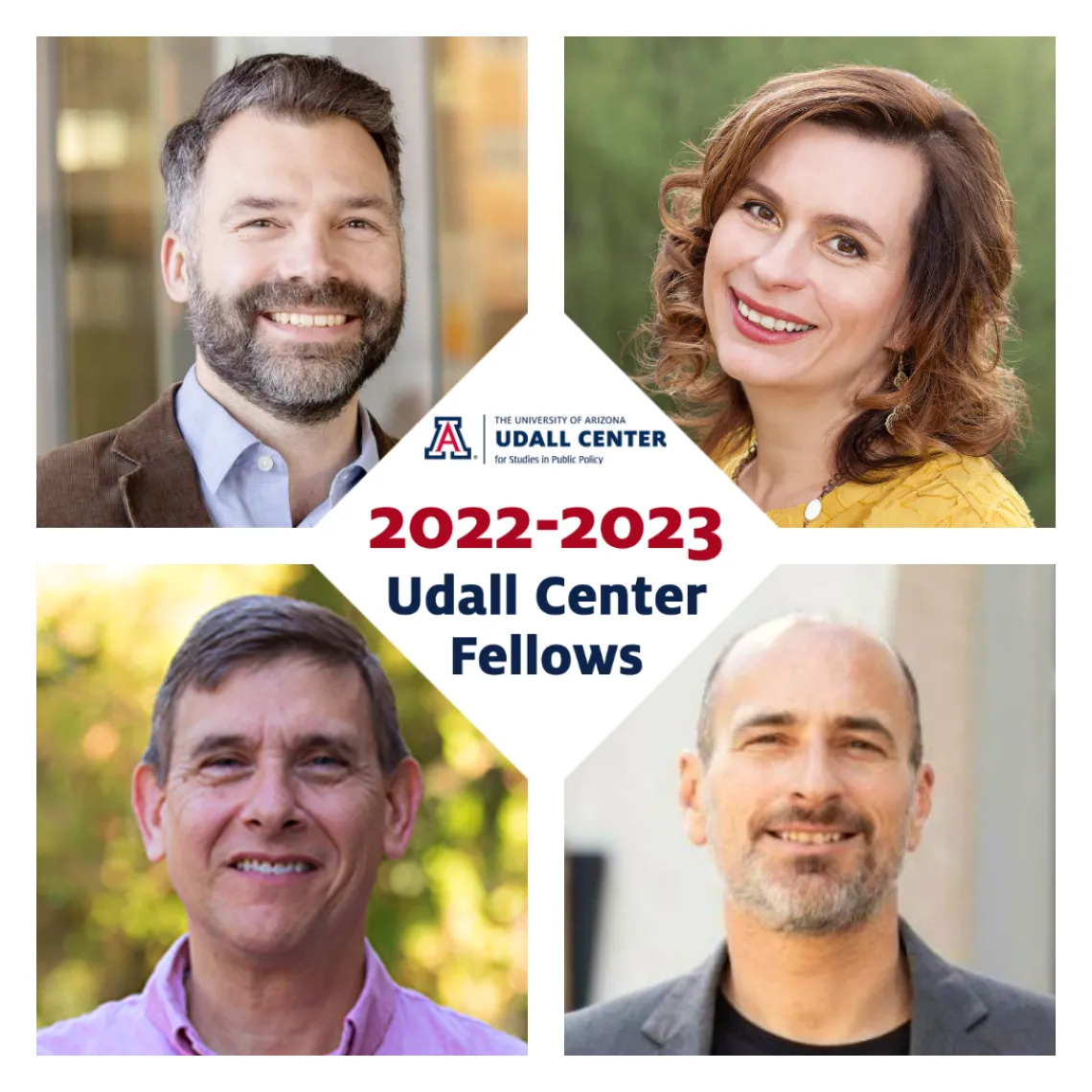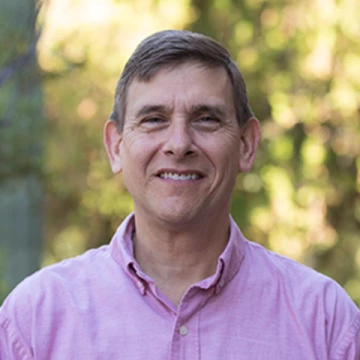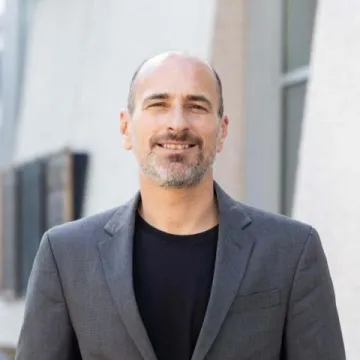Meet the 2022-23 Udall Fellows!
Since 1990, the Udall Center Fellows Program has invited UArizona faculty across campus to take a semester off from their teaching duties to focus on scholarly research that touches on some aspect of public policy.

Clockwise from top left: Jonathan Bean (CAPLA), Jamie Edgin (College of Science), Sergio Puig (College of Law) and David Pietz (SBS).
Now in its 33rd year, the Udall Center Fellows Program is pleased to welcome four new fellows to its 2022-23 cohort.
The Fellows Program operates as a partnership between the Udall Center for Studies in Public Policy; the Office of Research, Innovation and Impact (RII); the College of Social and Behavioral Sciences; other campus colleges; and, this year for the first time ever, the BIO5 Institute.
Fellows are released from teaching for a semester while they engage in their policy-related research.
Keep reading to learn more about this year’s Fellows.
Jonathan Bean: Assistant Professor at the College of Architecture, Planning and Landscape Architecture (CAPLA) School of Architecture

Professor Jonathan Bean, College of Architecture, Planning and Landscape Architecture.
Project title: Buildings, Energy, and Policy: Connecting the Dots at The University of Arizona and Beyond
According to Professor Bean’s Fellowship proposal, “Buildings are the single largest contributor to carbon emissions,” with 11 percent of carbon emissions coming from building construction and renovation and another 28 percent coming from ongoing building operation.
During his time away from teaching, Bean plans to focus his time on “gaining a deep knowledge of policies and policy mechanisms related to the goal of built environment decarbonization.”
His hope is that a more thorough knowledge of such policy and networking with other leaders in this area will not only help inform his own research, but will also help other UArizona researchers capitalize on some $400 billion in funds committed in recently passed legislation dedicated to climate and decarbonization efforts.
“I am especially interested in participating in the Udall Center’s Fellow Program,” Bean says, “...because decisions about where funding will flow, how it will be allocated, and who will administer funding for programs related to housing, buildings, and energy are under active consideration at [the Department of Energy] right now.”
Jamie Edgin: Associate Professor at the College of Science’s Department of Psychology

Professor Jaime Edgin, College of Science.
Project working title: State Policy Review of Abuse Reporting from Developmental Disability Groups
As an appointed member of the Arizona Developmental Disabilities Planning Council (ADDPC) between 2014-2018, Professor Edgin was reviewing projects for inclusion in the council’s five-year strategic plan when she noticed something that sent her alarm bells ringing.
Several projects related to preventing physical or emotional abuse of persons with disabilities were on the table for potential implementation, however no programs had been proposed to prevent sexual abuse.
Though the issue of sexual abuse of persons with disabilities had been not adequately addressed by many state and national organizations, a high-profile 2019 case involving the rape of an intellectually disabled woman at Hacienda Healthcare in Phoenix forced the topic into the national spotlight.
In her fellowship proposal, Edgin writes, “From the data that are available, we now know children and adults with intellectual and developmental disorders are 7-12 times more likely to be victims of sexual abuse.”
What’s more, Edgin’s research has revealed that “people with disability and their caregivers have doubts that their reports (of abuse) would be believed” if they reported them.
During her time as a Udall Center Fellow, Edgin intends to spend her time reviewing existing state policy “focused on abuse reporting in developmental disability” and convening a working group to “determine a research solution for the problem of abuse reporting procedures in these groups.”
All told, Edgin says her research will focus on answering a single multi-layered question: “Can we provide a solution that will help facilitate the safety of these individuals through the delivery of their reports, and alongside these methods, change the public’s perception of the validity of their reports?”
Edgin is the first faculty member to be selected as a Udall Center/BIO5 Institute Fellow.
David Pietz: Regents Professor at the College of Social and Behavioral Sciences’ Department of History

Professor David Pietz, College of Social and Behavioral Sciences.
Project title: Death and Life on the Yangtze: Extinction, Conservation, and Environmental Change in China
According to Professor Pietz, the 2006 extinction of the Baiji dolphin, endemic to the Yangtze River in China, is “both [a] destination and a point of departure” for his proposed research as a Udall Center Fellow.
The loss of the Baiji, Pietz says, “was the outcome of historical attitudes to the natural world, governance practices, and developmental policies.” It was also a turning point in the conservation conversation in China, and the driving force behind subsequent policies to protect another Chinese freshwater cetacean – the Finless porpoise.
Although we often tend to view conservation outcomes as the result of biophysical processes, Pietz emphasizes that “these processes are structured by culture.” The way societies look at things like biodiversity, animals, and conservation play a major role in the policies we enact and the steps we take to conserve species. And differences across cultures in this regard can impact our ability to cooperate on international conservation efforts.
Pietz’s research will look at “The philosophical and ethical approaches to nature, patterns of economic exchange, and governance practices [that] shape China’s culture-nature nexus” in order to evaluate “[h]ow these historical forces condition extinction, and how they frame the opportunities and choices available to conservation.”
Says Pietz, “A socio-ecological approach to this question… will allow natural scientists and humanists to place extinction and conservation in China within a comparative global framework,” which, in turn, can help researchers and policymakers “enhance our capacity to engage China in international environmental, scientific, and governance networks.”
Sergio Puig: Professor at the James E. Rogers College of Law’s International Trade and Business Law Program

Professor Sergio Puig, College of Law.
Project title: Globalization in the Age of Climate Justice
The negative repercussions of climate change are already being felt today. And, according to the science, those impacts will continue to increase exponentially over time and will have a disproportionate impact on the poor.
As Professor Puig explored in his 2021 book, At the Margins of Globalization: Indigenous Peoples and International Economic Law, “The unjust paradox of climate change is that countries with populations that only marginally contributed to the problem of greenhouse gas emissions will be substantially more affected.”
“Poor people are more exposed to the negative impacts of climate change and have fewer resources to adapt,” Puig says. “As put by a recent report: climate-change impacts are expected to exacerbate poverty in most developing countries and emerging economies.”
Puig argues that global economic models need to adapt to address these modern challenges by “implement(ing) a climate-friendly economic system based on fair laws and policies that incentivize more sustainable trade, greener investments, the transfer of adaptation technologies and responsible public and private financing.”
During his time as a Udall Center Fellow, Professor Puig will employ an interdisciplinary approach as he explores the landscape of international economic and trade law in service of answering what he calls “the most pressing question for international law scholars today: how should the frameworks that anchor economic interdependence adapt to propel and facilitate an era of climate justice?”
His findings will be compiled in a new book that will build on the discussions covered in his 2021 volume.

